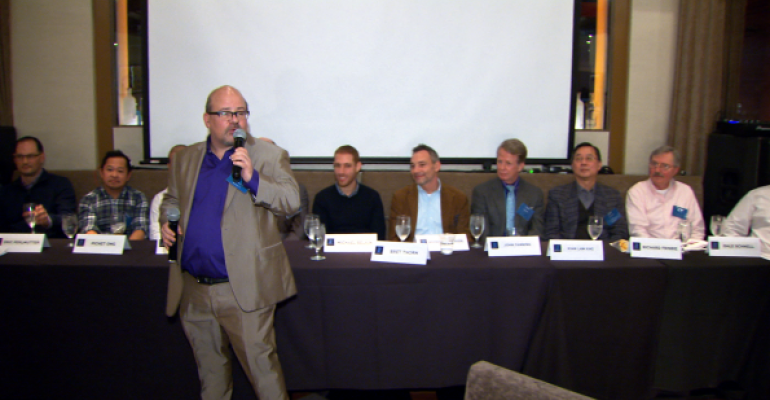
A publicist friend of mine asked me if I wanted to moderate a panel on gay food, and I agreed to it, because it looked like something that wouldn’t take much time, I like moderating panels, and the topics of gay identity and food are of interest to me.
Then I saw the press materials for the panel, which was to be held as part of the launch of a new gay social app: distinc.tt.
It had definitions like:
“Gay Food — food that prefers the company of other food from the same food group.”
Uh, no.
“Gay Chef — usually the best dressed in the kitchen.”
Not quite as ridiculous, but based on silly stereotypes, so, again, no.
“Gay Restaurant — where the attention is not on what’s on the plates but who’s in the seats.”
There’s a bit of truth to that in any full-service restaurant, but it’s not a gay thing.
“Gay Ingredient — What all the best restaurants will be using next season.”
Only if the restaurant business were an idealized version of Queer Eye for the Straight Guy, and even then, not really.
Nonetheless, I think the topic of LGBT people and our relationship with food is sociologically interesting, and, since the 15-16 million Americans over the age of 18 who self-identify as gay (according to a 2012 Harris Interactive poll), have an estimated disposable income of $790 billion, it’s of more than pure academic interest for restaurant operators.
I had fewer trepidations about the panel when I saw who would be on it. It included James Beard Foundation executive vice president Mitchell Davis, whose something of an intellectual titan when it comes to thinking and talking about food; celebrity pastry chefs Pichet Ong and Zac Young; SD26 general manager John Fanning; Dale Schnell, executive chef at KITCHN in the Out Hotel (obviously targeting a gay market), where the panel discussion was held; and other bloggers, chefs and restaurateurs, as well as Distinc.tt CEO Michael Belkin.
The afternoon event started with drinks and sandwiches — regular and vegan versions of the “LGBT sandwich” developed by panelist Michael Guerrieri, who owns City Sandwich in New York.
I spoke to Michael before the panel started and he said he’d been told to make the sandwich out of lettuce, guacamole, bacon and tomato (L, G, B and T, get it?), but Michael told me that sounded like the straightest sandwich ever. He then took it back because he didn’t want to play into stereotypes, but I’m going to mention it anyway, because it’s funny.
Instead, he made a sandwich of Linguiça spread, goat cheese, Portuguese smoked bacon and tomato, along with seasonal lettuce, sautéed onion and olive oil. It was delicious.
His vegan version had sautéed leeks, seasonal greens, aged balsamic-marinated beets and marinated spicy garlic tofu, and some olive oil. It was arguably more delicious than the meaty version.
I don’t think the Distinc.tt people wanted a frivolous panel, and if they did, well too bad, because it got pretty serious pretty fast. That’s not to say we didn’t joke around and keep the conversation moving, but Zac Young, arguably the most stereotypically gay man on the panel — cute, kind of flamboyant, a pastry chef — almost immediately steered the conversation toward topics of identity, stereotypes and misconceptions. Pichet Ong and others dispelled the idea that gays eat fancy food. On the contrary, restaurants catering to gay men, in particular (the conversation focused on gay men since, regrettably, no women were on the panel), tended to serve comfort food.
Mitchell Davis observed that no one had eaten the sandwiches before the panel started, and that indicated a mostly gay audience since, he said, gay men don’t tend to eat at gay social functions. It certainly didn’t have anything to do with the time of day, he said, noting that people ate heartily at afternoon functions at the Beard House.
We also touched on the idea of gay food bloggers (there are a lot of them, including two panelists — Kian Lam Kho, who is also the chef of Lotus Blue restaurant in New York, and Richard Frisbie) and of gay artists in general.
Guerrieri posited the idea that since gays traditionally have not felt free to be ourselves in public, we used art as an outlet for self-expression, and he and John Fanning noted that, since we have to be aware of our own nuances of behavior in public, where until recently it was not okay to be openly gay, we tend to have more attention to detail.
I thought those were interesting points, and Davis wondered if that might change as it becomes more socially acceptable to be gay.
And that’s interesting because it seems like the same thing is happening to chefs. Many chefs fell into cooking after having difficult times at home or in school, or feeling socially outcast for whatever reason. They found solace in the meritocracy that is the professional kitchen — a workplace that has traditionally taken in misfits and ne’er-do-wells and helped them channel their energy toward delicious food.
Now that being a chef is widely regarded as an honorable profession, I wonder how that will change the tenor of the kitchen as a workplace.
That’s obviously an invitation for you to share your own opinions in the comments section below.
Also, please enjoy this excerpt from the panel.

